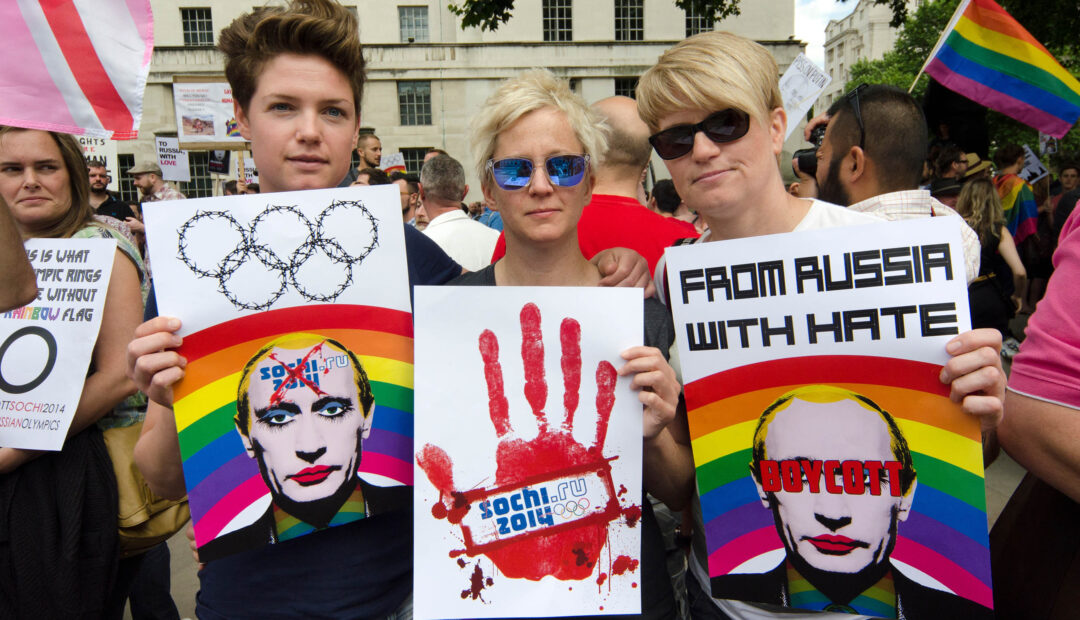Police in Russia began raiding gay bars on Friday night after the top court approved a ban on the worldwide LGBTQ+ movement.
So what does it even mean to ban a movement? The Supreme Court in Russia has officially classified the LGBTQ+ movement as an “extremist organization,” according to Time, and has banned any activism or advocacy for the rights of queer individuals.
The court ruling was decided in response to a lawsuit filed by Russia’s Justice Ministry. In a statement released before the final decision, the ministry accused the LGBTQ+ movement of indicating “various signs and manifestations of extremism, including incitement to social and religious hatred.”
Across the country, police raided nightclubs, male saunas, and bars that hosted LGBTQ+ parties under the guise of executing drug raids. Police then checked the documents of event goers and even photographed identification cards, presumably to record those involved in the newly banned movement.
Since the official court ruling several LGBTQ+ businesses have already shut down in places like St. Petersburg. Associate director for Human Rights Watch’s Europe and Central Asia division said “If you speak at all about LGBT rights, whether you do it by protesting peacefully or just posting comments on social media by saying anything in public, anything at all, you’re going to be in trouble.”
There were efforts to block the law from approval. A leading human rights group in Russia filed a document with the court that claimed the lawsuit brought upon by the Justice Ministry was discriminatory, and violated the Russian constitution.
According to AP News this is just “the latest step in a decade-long crackdown on LGBTQ+ rights under President Vladimir Putin, who has emphasized ‘traditional family values’ during is 24 years in power.”
Since the Russian invasion of Ukraine, the country has doubled down on left-leaning groups and organizations, and anti-LGBTQ+ laws in the country have become even more pervasive. Same-sex marriage was outlawed in 2020, and one law allows authorities “to fine any individual or organization found to have promoted homosexuality in public, online, or in films, books or advertising,” according to Reuters. Additionally, earlier this year, Russian lawmakers passed a bill outlawing gender reassignment procedures for transgender people.
Though the complete erasure of a progressive movement in a country should be shocking, a global trend in anti-LGBTQ+ hate and legislation makes this court ruling easy to believe. In more self-proclaimed “progressive” countries, LGBTQ+ people are still facing an uptick in hate crimes, and targeted legislation that attempts to erase their existence and livelihood. In the U.S., drag bans, censorship and various violations of identity have plagued states like Florida, where hateful politicians run the show.
Despite this, a worldwide trend from the Pew Research Center indicates an increase in public support for the legalization of same-sex marriage. But on a wider scale, depending on where you are in the world, that support can feel scarce. Time reports “92% of Swedes are in favor or same-sex marriage, compared to just 2% of Nigerians.”
So what does this mean for the LGBTQ+ community in Russia? It means no more LGBTQ+ friendly bars and safe public spaces, no more posting or interacting openly on social media in favor of LGBTQ+ causes, it means that the space that existed for the promotion of LGBTQ+ rights and the amplification of queer voices will now be silent and empty, and those who choose to speak against the ban will be penalized.


